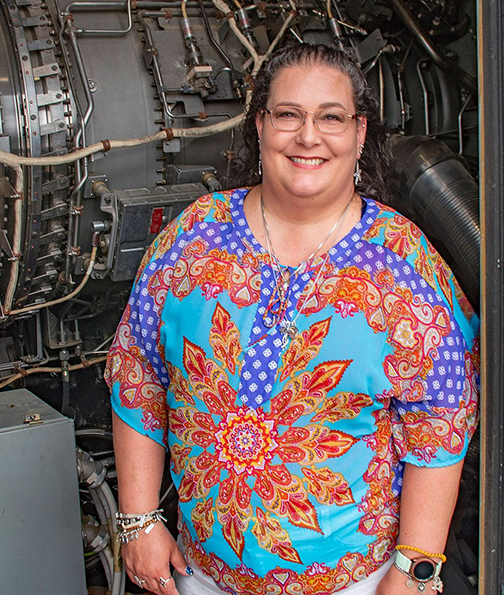Welcome!

Trinity High School teacher Mindy Thornlow interned this summer with Randolph Electric Membership Corporation. Contributed photo
REMC internship powers teacher to upgrade curriculum
ASHEBORO — Mindy Thornlow will have a wealth of information for her science students at Trinity High School this year. She did a three-week internship at Randolph Electric Membership Corporation to learn how electricity is provided to rural homes.
Thornlow was chosen for the Kenan Fellows Program for Teacher Leadership, which was carried out this year by a partnership between REMC and NC State University. The summer internship was part of a year-long career development program.
During her internship, Thornlow worked with staff and crews at the Asheboro and Robbins headquarters.
Thornlow talked about her experience with Nicole Arnold, REMC communications and public affairs manager, on a podcast produced by the cooperative. When she learned she was selected for the fellows program with REMC, Thornlow said, “I knew it had to do with electricity so I did research. I was thrilled because electricity is one of the subjects I teach.”
She is scheduled to teach physical science and earth science this year but has also taught chemistry and physics. She plans to “hone into how to bring (what she learned during her internship) into the curriculum. I’m going to be teaching an energy unit, (including) how it’s converted from different forms to provide services, and to show how electricity works.”
Thornlow said she would also teach a unit on “alternative energy sources — what’s good, what’s bad, what’s OK and what doesn’t work all the time.”
Arnold noted that Thornlow hasn’t always been a teacher but joined the Navy straight out of high school before doing other jobs. Thornlow is starting her 17th year in teaching with a variety of life experiences to share with her students.
“WIth a variety in my working adult life, I want to show that there are different things to do,” she said. “I learned a variety of stuff in the Navy,” including oceanography and meteorology. “I want to show students there’s a variety of things to do in the private sector … to benefit others.”
During her internship, Thornlow learned about the cooperative model, spending time in the field and in the office to see how they provide safe, reliable energy.
She said her first week focused on the big picture in how things work together.
The second week, she saw how cooperatives across the state work together and that customers can walk in the door to talk about problems.
In the third week, Thornlow said, saw how power is created to help those out in rural areas. She told the story of going out with a crew to the home of an 88-year-old woman whose power was knocked out when a tree fell across the electrical lines, ripping the power base from her home.
Even after restoring the lines and the power base, the crew couldn’t turn on the electricity until after everything was inspected. The crew members showed concern for the woman, who was out of power for 36 hours during the hottest part of the summer.
“I saw the cooperative come together as a family to help a member,” Thornlow said. “This to me was what it was all about.”
Arnold said that was the cooperative model in action — concern for the community.
At the close of the podcast, Thornlow said she was “thankful for the opportunity. Now I can bring more to my students.”
